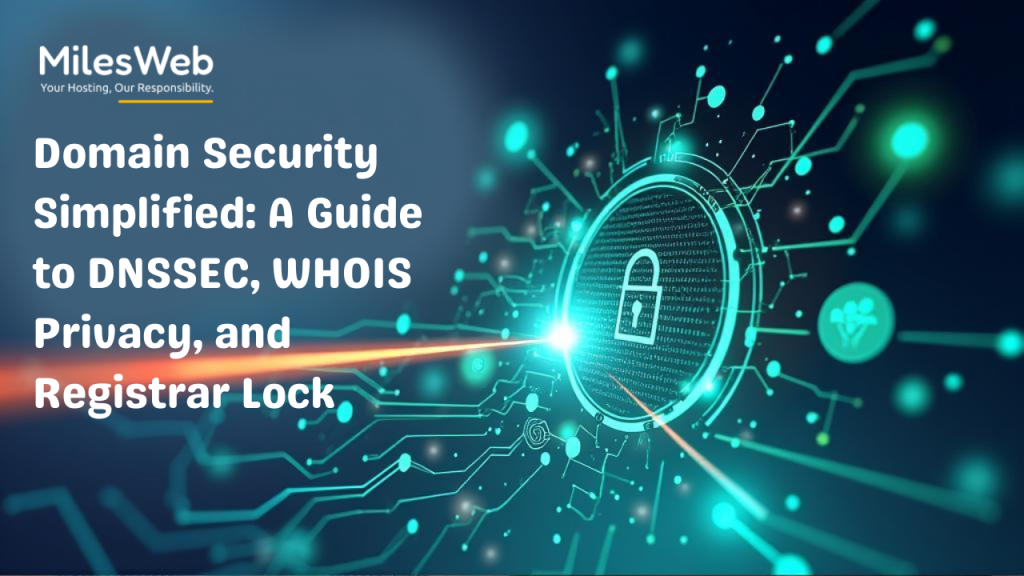
As the digital competition intensifies, the domain has gained significance like never before. A domain name is not just a simple URL for registering a digital presence, but also a beacon of your brand’s unique identity. A business with an established domain gains more brand recognition and succeeds in gaining trust among customers. When you decide to buy domain online, you need to subscribe to the services of a provider that offers modern protection features such as DNSSEC, WHOIS privacy, and registrar lock. If your existing service provider doesn’t offer these services, you can switch to another platform through domain transfer offers.
In a rapidly evolving digital space, cyberattacks are intensified and targeting online websites with new hacking tricks. That’s why you can not compromise on domain security when trying to find cheap domain offers. Get an in-depth understanding of how you can protect your domain against fraudulent activities and secure your brand credibility.
How Cheap Domain Transfer Offers Can Compromise Security?
When you have a domain, you’ll come across many offers from different registrars to transfer your domain to their platform. One should not partner with service providers who may compromise on security parameters.
When you decide to migrate your domain to another service provider, ensure that the platform conducts the transfer process seamlessly. It has been observed that cybercriminals track such transfers to identify protection loopholes and breach security frameworks.
Buying a Domain Online to Secure Digital Identity
It’s great that you start your business’s online journey by taking your website live with a unique domain name. However, just selecting the best domain name doesn’t mean your work is over. A domain’s security can be compromised by cyberattackers through unauthorized transfers or DNS attacks if there are no proper security frameworks in place.
Conduct proper research to find the most trustworthy registrar, one that is renowned for offering advanced security features such as domain lock, DNSSEC, and WHOIS privacy. When you have all these security check boxes ticked, it gives you worry-free sleep as your service provider takes care of your domain’s protection.
Why is DNSSEC Essential for Domain Security?
DNSSEC (Domain Name System Security Extensions) is a key security feature that ensures the protection of online digital addresses. It guarantees the authenticity and consistency of information flow between a domain and a browser. When this extension is integrated, data shared with users through DNS remains accurate without manipulation. Without DNSSEC, cyberattackers can breach security and perform malicious activities on your platform.
DNSSEC mandates the use of digital signatures during data transfers as a part of the domain protection framework. When users visit a domain, this security framework ensures they land on the exact address without any glitch. Choose a domain registrar that provides this essential component under your domain subscription. A platform that handles sensitive customer information and deals with financial transactions needs this feature the most.
How Does WHOIS Privacy Matter for Your Domain?
During the domain purchase process with your registrar, your details may become publicly visible. The WHOIS privacy feature helps you hide your domain details, so they’re not available for public exposure. It’s necessary to protect your confidential data from spammers and secure your platform against potential attacks. Those who overlook this security feature face repercussions in the form of domain loss or unauthorised activities on their platform.
WHOIS works as a security block that protects your identity from spammers. Your domain registrar replaces your personal information with dummy details to facilitate your domain with strong security measures. It helps to avoid unwanted calls or messages that might cause hurdles in your crucial communications. Additionally, it also lowers the risk of a security breach as hackers don’t get access to your original details.
Registrar Lock for Preventing Unauthorized Transfers
With a registrar lock, you can ensure the protection of your domain against unauthorized transfers. This feature enables lock protection for the domain, so that no one can breach its security. Only you or a person with your account details can unlock it and then proceed with the domain transfer if needed.
If you’re managing multiple domains or special domains with higher values, registrar lock should be the central feature you look for when selecting a domain service provider. Additionally, financial platforms that are always on high alert for potential cyberattacks must ensure this component is integrated for their domain.
Conclusion
If you’re running an online business, you should not treat domain security as an optional feature. With the continuous rise in cyberattacks and fraudulent activities, domain security needs to be taken seriously. Registrar lock, DNSSEC, and WHOIS privacy are some must-have security protocols that protect your domain from hijacking incidents.
Besides core security parameters, it’s essential to cross-check domain transfer offers that appear as cheap deals. You should verify that your registrar is a genuine entity and conducts a secure domain transfer process. Your digital address is your biggest strength; ensure you protect it to maintain customer trust in your brand.

Leave a Reply